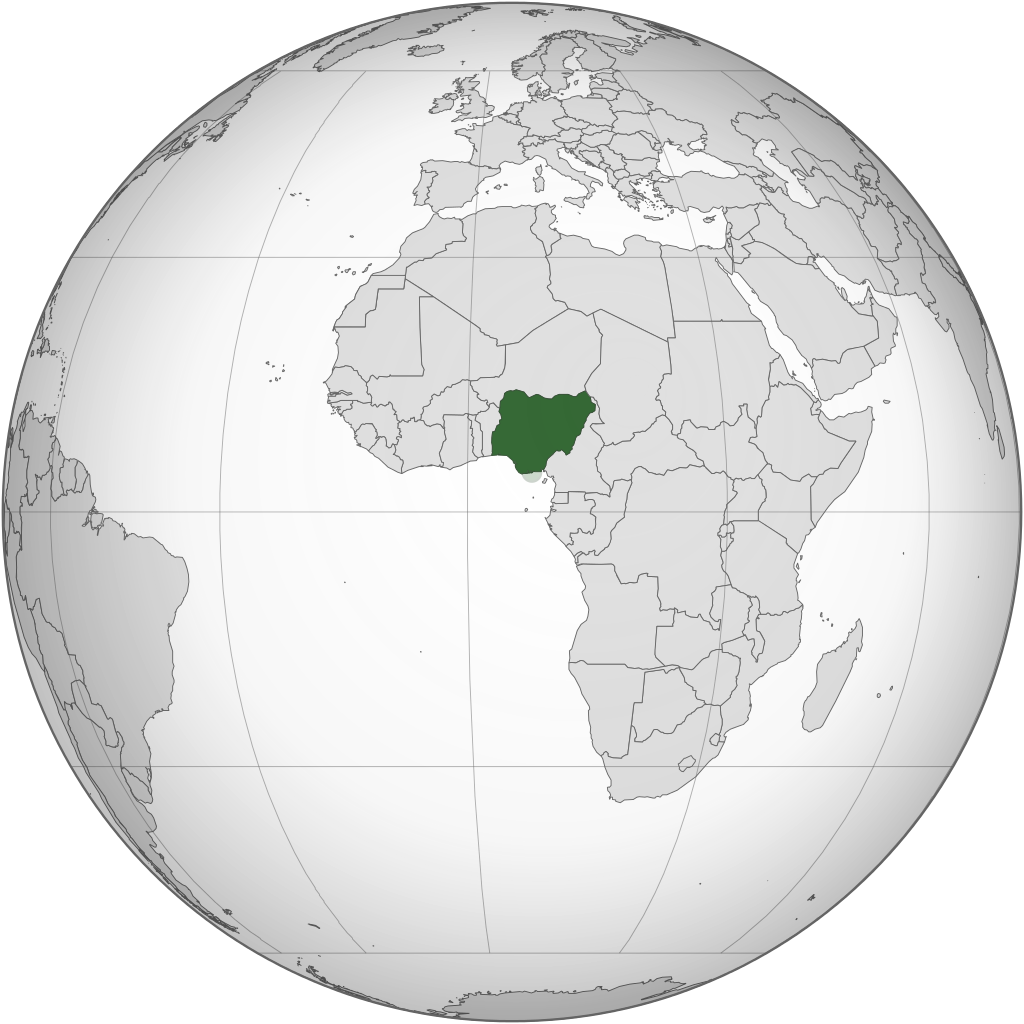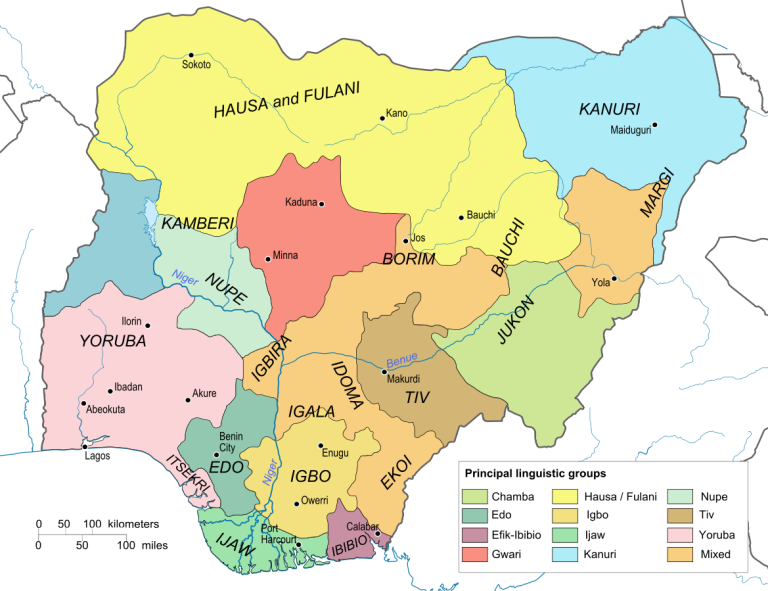Federal Republic of Nigeria: Difference between revisions
More languages
More actions
(Created page with "{{Infobox country|name=Federal Republic of Nigeria|native_name=Jamhuriyar Tarayyar Najeriya<br>Ọ̀hàńjíkọ̀ Ọ̀hànézè Naìjíríyà<br>Orílẹ̀-èdè Olómìniira Àpapọ̀ Nàìjíríà|capital=Abuja|largest_city=Lagos|mode_of_production=Capitalism|image_map=Nigeria map.png|map_width=290|official_languages=English|national_languages=Hausa<br>Igbo<br>Yoruba|area_km2=923,769|population_estimate=218,541,212|population_estimate_year=2022}} '''Nigeria''',...") Tag: Visual edit |
General-KJ (talk | contribs) (Minor expansion) Tag: Visual edit |
||
| (2 intermediate revisions by one other user not shown) | |||
| Line 1: | Line 1: | ||
{{Infobox country|name=Federal Republic of Nigeria|native_name=Jamhuriyar Tarayyar Najeriya<br>Ọ̀hàńjíkọ̀ Ọ̀hànézè Naìjíríyà<br>Orílẹ̀-èdè Olómìniira Àpapọ̀ Nàìjíríà|capital=Abuja|largest_city=Lagos|mode_of_production=[[Capitalism]]|image_map=Nigeria map.png|map_width=290|official_languages=English|national_languages=Hausa<br>Igbo<br>Yoruba|area_km2=923,769|population_estimate= | {{Infobox country|name=Federal Republic of Nigeria|native_name=Jamhuriyar Tarayyar Najeriya<br>Ọ̀hàńjíkọ̀ Ọ̀hànézè Naìjíríyà<br>Orílẹ̀-èdè Olómìniira Àpapọ̀ Nàìjíríà|image_flag=Flag of Nigeria.svg|image_coat=Coat of arms of Nigeria.svg|capital=Abuja|largest_city=Lagos|mode_of_production=[[Capitalism]]|government_type=Federal presidential republic|leader_title1=President|leader_name1=[[Bola Tinubu]]|image_map=Nigeria map.png|map_width=290|official_languages=English|national_languages=Hausa<br>Igbo<br>Yoruba|demonym=Nigerian|area_km2=923,769|population_estimate=230,842,743|population_estimate_year=2023}} | ||
'''Nigeria''', officially the '''Federal Republic of Nigeria''', is a country in West Africa. Since its independence from the [[United Kingdom of Great Britain and Northern Ireland|British]] in 1960, it has been dominated by [[neocolonialism]].<ref name=":0">{{Web citation|newspaper=[[The Burning Spear]]|title=Boko Haram and the explosion of neocolonial rule in Nigeria|date=2014-07-01|url=http://www.theburningspear.com/2014/07/boko-haram|archive-url=https://web.archive.org/web/20201108192227/http://www.theburningspear.com/2014/07/boko-haram|archive-date=2020-11-08|retrieved=2022-08-14}}</ref> | '''Nigeria''', officially the '''Federal Republic of Nigeria''', is a country in [[West Africa]] situated south of the [[Sahel]] with a southern coast on the [[Atlantic Ocean]]. Nigeria borders [[Republic of Cameroon|Cameroon]] to the east, [[Republic of Chad|Chad]] to the northeast, [[Republic of the Niger|Niger]] to the north and [[Republic of Benin|Benin]] to the west. Since its independence from the [[United Kingdom of Great Britain and Northern Ireland|British]] in 1960, it has been dominated by [[neocolonialism]].<ref name=":0">{{Web citation|newspaper=[[The Burning Spear]]|title=Boko Haram and the explosion of neocolonial rule in Nigeria|date=2014-07-01|url=http://www.theburningspear.com/2014/07/boko-haram|archive-url=https://web.archive.org/web/20201108192227/http://www.theburningspear.com/2014/07/boko-haram|archive-date=2020-11-08|retrieved=2022-08-14}}</ref> | ||
== History == | |||
=== Civil War === | |||
After independence, the north supported the [[Nigeria People's Congress]], the south supported the [[Action Group (Nigeria)|Action Group]], and the west supported the [[Council for Nigeria and the Cameroons]]. A group of Igbo colonels led a coup in 1966 before being overthrown by Hausa officers. The southeastern region of [[Biafra]] declared independence in 1966, leading to a civil war that killed a million people. Nigeria quickly reconquered Biafra with [[French Republic|French]] support.<ref name=":1222">{{Citation|author=[[Vijay Prashad]]|year=2008|title=The Darker Nations: A People's History of the Third World|chapter=Notes|page=327|pdf=https://cloudflare-ipfs.com/ipfs/bafykbzaceascnzh26r5d6uitjjs2z7rflhaxlt7rboz5whzdf76qg6xxvecqq?filename=%28A%20New%20Press%20People%27s%20history%29%20Vijay%20Prashad%20-%20The%20darker%20nations_%20a%20people%27s%20history%20of%20the%20third%20world-The%20New%20Press%20%282008%29.pdf|publisher=The New Press|isbn=9781595583420|lg=https://libgen.rs/book/index.php?md5=9B40B96E830128A7FE0E0E887C06829F}}</ref> | |||
== Economy == | == Economy == | ||
Nigeria's economy relies on oil, which is owned by foreign companies. It sells over two million barrels of oil every day, but is forced to import much of its oil from the imperial core. 80% of the Nigerian population lives on less than $2 per day.<ref name=":0" /> | Nigeria's economy relies on oil, which is owned by foreign companies. It sells over two million barrels of oil every day, but is forced to import much of its oil from the imperial core. 80% of the Nigerian population lives on less than $2 per day.<ref name=":0" /> | ||
== Demographics == | |||
[[File:Nigeria linguistic map.png|thumb|Linguistic groups of Nigeria]] | |||
Northern Nigeria is dominated by the Hausa, whereas the Yoruba live in the south and the Igbo in the west.<ref name=":1222" /> | |||
== References == | == References == | ||
Latest revision as of 00:11, 4 September 2024
| Federal Republic of Nigeria Jamhuriyar Tarayyar Najeriya Ọ̀hàńjíkọ̀ Ọ̀hànézè Naìjíríyà Orílẹ̀-èdè Olómìniira Àpapọ̀ Nàìjíríà | |
|---|---|
 | |
| Capital | Abuja |
| Largest city | Lagos |
| Official languages | English |
| Recognised national languages | Hausa Igbo Yoruba |
| Demonym(s) | Nigerian |
| Dominant mode of production | Capitalism |
| Government | Federal presidential republic |
• President | Bola Tinubu |
| Area | |
• Total | 923,769 km² |
| Population | |
• 2023 estimate | 230,842,743 |
Nigeria, officially the Federal Republic of Nigeria, is a country in West Africa situated south of the Sahel with a southern coast on the Atlantic Ocean. Nigeria borders Cameroon to the east, Chad to the northeast, Niger to the north and Benin to the west. Since its independence from the British in 1960, it has been dominated by neocolonialism.[1]
History[edit | edit source]
Civil War[edit | edit source]
After independence, the north supported the Nigeria People's Congress, the south supported the Action Group, and the west supported the Council for Nigeria and the Cameroons. A group of Igbo colonels led a coup in 1966 before being overthrown by Hausa officers. The southeastern region of Biafra declared independence in 1966, leading to a civil war that killed a million people. Nigeria quickly reconquered Biafra with French support.[2]
Economy[edit | edit source]
Nigeria's economy relies on oil, which is owned by foreign companies. It sells over two million barrels of oil every day, but is forced to import much of its oil from the imperial core. 80% of the Nigerian population lives on less than $2 per day.[1]
Demographics[edit | edit source]

Northern Nigeria is dominated by the Hausa, whereas the Yoruba live in the south and the Igbo in the west.[2]
References[edit | edit source]
- ↑ 1.0 1.1 "Boko Haram and the explosion of neocolonial rule in Nigeria" (2014-07-01). The Burning Spear. Archived from the original on 2020-11-08. Retrieved 2022-08-14.
- ↑ 2.0 2.1 Vijay Prashad (2008). The Darker Nations: A People's History of the Third World: 'Notes' (p. 327). [PDF] The New Press. ISBN 9781595583420 [LG]


